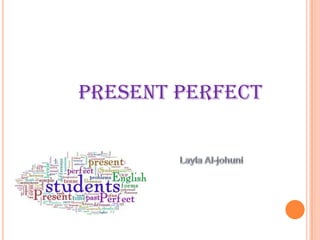
Present Perfect Tense Explained
- 2. Present Perfect Tense There are 2 primary reasons to use the Present Perfect Tense. Reason # To talk about a completed past action at a non-specific time. The action is finished. You don’t know, care or remember when it happened. For example: I’ve read that book before. She’s already done her homework.
- 3. Reason #2 With the words “for” and “since” to talk about something that began in the past and continues to now. For example: I’ve studied at this school since last June. She’s lived in West Palm Beach for six months.
- 4. When we use the Present Perfect with “for” or “since” it gives the idea that something began in the past and continues into the present (and may continue into the future.) SINCE + POINT IN TIME Use the present perfect with “since” + point in time (since Sunday, since 4:00, since 1996) to show when something started I’ve studied at this school since last year
- 5. For + LENGTH OF TIME Use the Present perfect with “for” + length of time ten minutes, for two weeks, for years, for a long time) to show how long a present condition has lasted. They’ve been married for a long time. He’s lived in Yanbu for 8 months.
- 6. Here is a brief review of the form and function of the present perfect tense. The present perfect is used when the time period has not finished: I have seen three movies this week. (This week has not finished yet.) The present perfect is often used when the time is not mentioned: Gerry has failed his exam again. The present perfect is often used when the time is recent: Ahmad has just arrived in Victoria .
- 7. Making the correct form. Jack (be)……… my friend for over 20 years. We (know) ………. each has been have known other since we were children. Recently, he and his family (move)…….. tomoved have a house on the same street as me, and now our children play together almost every day. For the last ten years, Jack and I (play)… have played the same hockey ……..for team every Saturday. Jack is a better player than I am, but in the last few months he (have) ………some trouble with his left knee, and he (find) has had ……….. it hard to play a full game. He (see) ………..the doctor several has found has seen times about his knee, but the doctor doesn't know what is causing his pain. Jack (decide)………….. to take a break from hockey for a while, so that his has decided knee can recover. It's going to be lonely on the team without him!
- 8. 1.Which is correct? a) for a long period b) since a long period 2.Which is correct? a) for 6 years b) since 6 years 3.Which is correct? a) for 6 weeks b) since 6 weeks
- 9. Choose the correct answer: I’ve….my car keys. I can’t find them any where. a) Loosed b) lose c) lost d) loose I’ve…….Peter since we were kids. a) Knew b) knowed c) known d) know Ahmad has……a lovely little house in the south of France. a) Buyed b)bought c)buy d)boughted
- 10. Have you ……..that new film yet? a) saw b) seen c) seed d) sawen Jane has……a long letter to her Spanish penfriend a) Wrote b)wrotten c)writted d)written Have you …….Time’s good news ?He’s getting married a) Heared b)heard c) hear d) hearn
